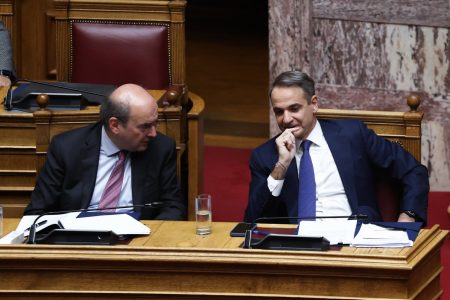By Antonis Karakousis
There are certain public issues that reveal the quality of governance.
One such is the case of Greece’s Public Power Corporation (PPC).
In the university public finance textbooks of the late Panteio University rector Sakis Karagiorgas there was a particular focus on the case of the Public Power Corporation (DEH), as it reflected the ability of the state to create and effectively operate a large public enterprise for the public good.
Indeed, in the first post-war decades PPC operated as a model of an efficient and profitable enterprise. It built large electricity production plants, exploited domestic lignite deposits, built impressive hydroelectric plants, and created what was for that time a pioneering and trustworthy electric grid that managed to encompass even the most remote islands.
Equally importantly, it attracted exceptional engineers and technicians that could meet all its needs.
PPC also succeeded in offering its clients cheap electricity as compared to other countries. Until a few years ago, PPC’s pricing contributed to the competitiveness of the Greek economy. Its results were based on specific principles and good management which was universally recognised.
The principles which Sakis Karagiorgas extolled were undermined along the way, mainly by governments which sought to exploit for political gain the largest enterprise in the Balkans.
The first problems with PPC’s operation appeared during Pasok rule in the 1980’s, when partisan-based trade unionism and the ruling party’s control of the enterprise emerged.
The late conservative PM Constantine Mitsotakis had promised a cleanup of the company but at the end of his term in 1993 and under pressure he made it a base of patronage and hired 6,000 employees en masse based exclusively on their party affiliation.
What followed was a period of simple management and in 2000 at the start of PM Costas Simitis’ (Pasok) second term when Nikos Christodoulakis was the competent minister there was an effort to radically restructure the corporation.
The period between 2000 and 2005 was one of revival and a real restructuring of PPC under the leadership of president Dimitris Papoulias and CEO Stergios Nezis.
Organisational weaknesses were addressed, borrowing was reduced, investments were made, and the corporation was listed on the Athens Stock Exchange on a good footing and became very profitable.
PPC was on its way to again becoming a model publicly owned enterprise for the entire public sector.
When Kostas Karamanlis came to power and appointed Yannis Palaiokrassas to head PPC, it took only two years for the enterprise to be devalued and scorned , and that has been the case ever since.
From then until now we have seen incompetent or lacking management teams come and go without being able to put PPC on a path of growth and profitability.
Handover to trade unionists
The situation spun out of control when SYRIZA came to power in 2015 and PPC came under the purview of Productive Reconstruction, Environment and Energy Minister Panagiotis Lafazanis, a man with ideological fixations but no management experience who handed the corporation over to the unions.
Four years later, the enterprise is disintegrating and nearly bankrupt. Because the debt burden of PPC is huge the banks that gave it loans are also imperiled.
PPC’s problem is now systemic. Its failure and collapse reflects all the weaknesses and dysfunctions of the current government and the corporation’s own dysfunctions.


